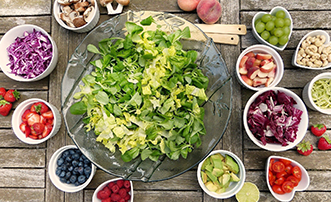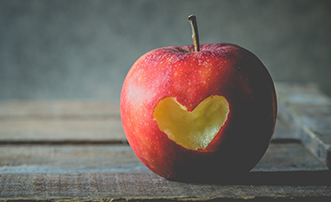Winter blues can be difficult to beat with less sunlight, colder temperatures, and having to stay inside more often. It leaves us feeing lethargic, gloomy, and maybe even depressed. Luckily, nutrition can help us beat the winter blues!
There is a connection between our mental health and our gut health through the vagus nerve. The brain and our gut are always in communication. Hormones control many things in our body, one of them being our mood. A hormone called serotonin, which regulates our mood and emotion, is produced in our digestive tract. If we have low serotonin levels, we may feel groggier. Researchers have found that people with a healthy gut are less likely to develop anxiety or depression. Some foods that may help are:
Leafy greens and lettuces – contain many nutrients such as folate, magnesium, and omega-3s. All these nutrients support mental health and brain health. Studies have shown that deficiencies in folate may contribute to fatigue and depression. Broccoli – high in folate, fiber, vitamin C, and selenium. Studies have suggested that low levels of selenium might contribute to depression, anxiety, and fatigue. Broccoli is a great food to eat since it contains folate and selenium. Fiber is a prebiotic which creates an ideal environment for probiotic bacteria to survive in the gut.
Chia seeds – have a high amount of omega-3 fatty acids. Omega-3 fatty acids are important for the production of serotonin and dopamine, which are both important hormones for mood and mental health. Chia seeds also contain magnesium, sometimes referred to as the stress antidote. Studies conducted by researchers Karen and George Eby have shown that diets with magnesium improved symptoms of depression in as few as seven days.
Yogurt – a great source of probiotic bacteria since it is a fermented food. The healthier our gut, the healthier our brain and mental health! Nutritionist suggest switching between different brands of yogurt to get a variety of bacteria. Also look for a yogurt with live cultures and low sugar content. Yogurt also contains a great amount of vitamin D, which affects our serotonin levels and impacts our mood.
Berries – Many berries such as strawberries, raspberries, blueberries, and blackberries contain antioxidants. Antioxidants are great for brain health and help ward off dangerous free radicals. Published studies treated two groups of patients for two years. One group received antioxidants, while the other received a placebo. The group who received antioxidants had significantly lower depression scores.
Avocados – are packed with healthy fats which are great for brain health. They also contain tryptophan which is an amino acid that has a powerful effect on mental health and mood by balancing hormones and help in producing serotonin.
Tomatoes – are a great source of folic acid and alpha-lipoic acid. Folic acid helps to prevent the build-up of homocysteine in the body. Homocysteine blocks our mood boosting hormones like serotonin, dopamine, and norepinephrine. Alpha-lipoic acid aid the body in converting glucose to energy, which stabilizes mood.
Source: newportacademy.com




